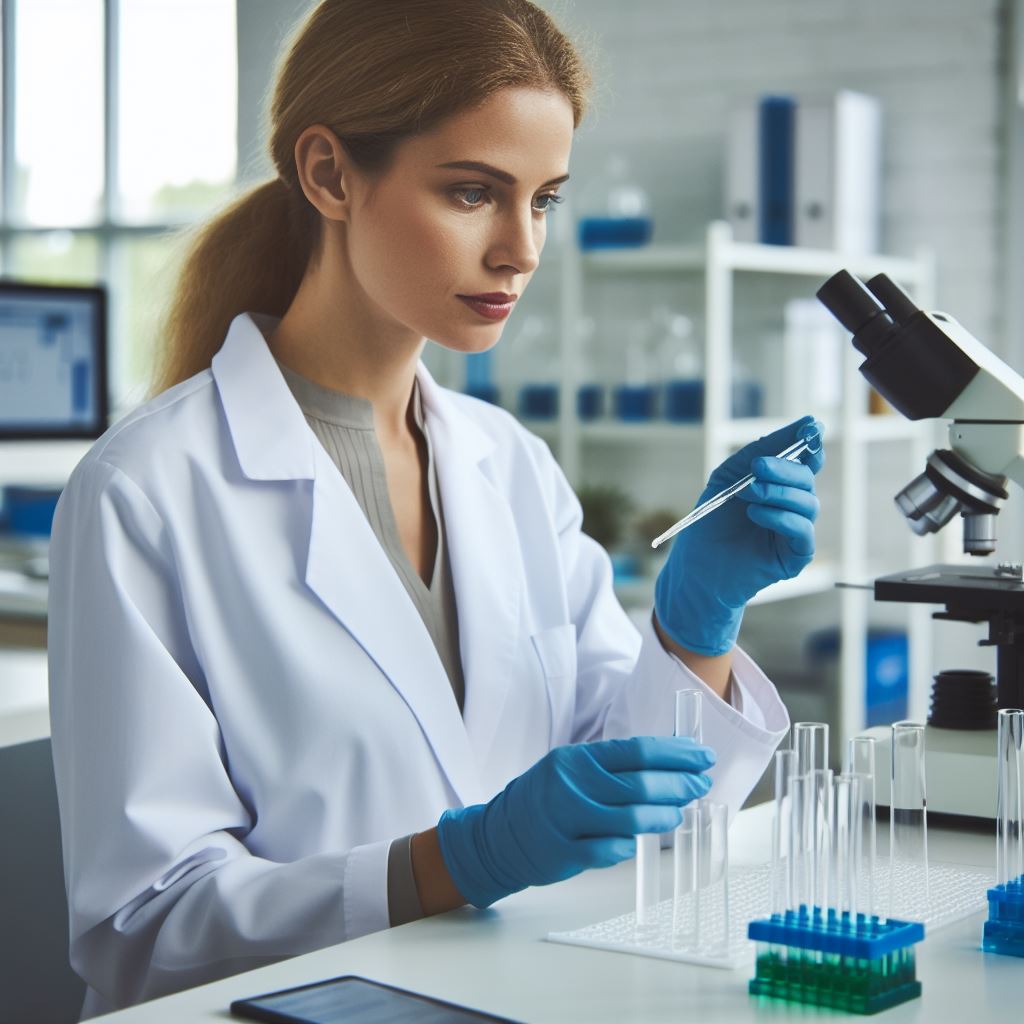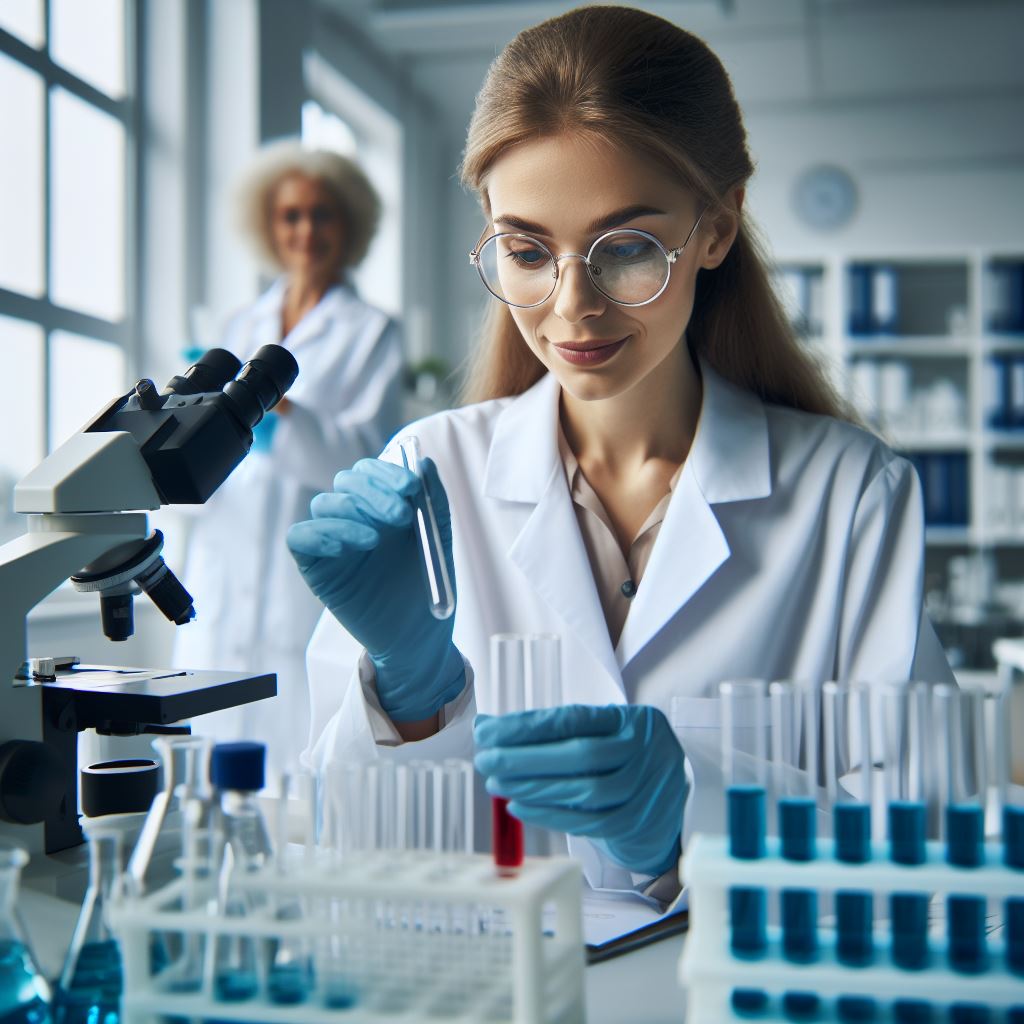Introduction
In the dynamic realm of scientific exploration, lab technicians in the UK emerge as unsung heroes, their daily activities weaving the intricate fabric of research.
These professionals serve as linchpins, orchestrating the seamless functioning of laboratories that span an array of scientific fields.
The role of a lab technician is multifaceted, encompassing responsibilities that range from equipment maintenance to experiment setup and data analysis.
Their hands-on expertise ensures the smooth progression of experiments and contributes significantly to the accuracy and reliability of research outcomes.
Lab technicians are the backbone of scientific endeavors, working tirelessly behind the scenes to support researchers and scientists.
Their precision and attention to detail are paramount, as they navigate the intricacies of various laboratory techniques and protocols.
The significance of lab technicians reverberates across disciplines, from biology and chemistry to physics and beyond.
Their contributions extend beyond the confines of a laboratory, impacting advancements in medicine, technology, and environmental studies.
In this exploration of a day in the life of a UK lab technician, we delve into the nuanced responsibilities and the pivotal role they play in the scientific landscape.
From conducting experiments to troubleshooting, their active involvement ensures that the gears of scientific progress continue to turn smoothly.
Overview of the Role
- Responsibilities of a UK lab technician: Conducting experiments, analyzing samples, maintaining lab equipment.
- Importance of accuracy and precision: Crucial for producing reliable and valid results in scientific research.
- Role in assisting scientists and researchers: Conducting preliminary tests, collecting data, providing technical support.
In this section, we will provide an overview of the role of a UK lab technician.
We will discuss their responsibilities, the importance of accuracy and precision in their work, as well as their role in assisting scientists and researchers.
Responsibilities of a UK Lab Technician
A lab technician in the UK is responsible for a wide range of tasks in a laboratory setting. They play a critical role in conducting experiments, analyzing samples, and maintaining lab equipment.
Lab technicians are involved in setting up and carrying out experiments, following specific protocols and standard operating procedures.
They may be required to handle hazardous materials and must ensure that safety guidelines are strictly adhered to at all times.
Additionally, lab technicians perform various tests and measurements to analyze samples and record the data accurately.
They often use sophisticated instruments and must have the technical skills to operate and maintain them properly.
Importance of Accuracy and Precision
Accuracy and precision are paramount in the work of a lab technician. The results they produce must be reliable and valid, as they form the basis for scientific research and experimentation.
A lab technician must carefully follow procedures and protocols to ensure accuracy in measurements and data collection.
Any errors or deviations could lead to inaccurate conclusions and affect the overall quality of research.
Precision is equally important as it relates to the consistency and reproducibility of results.
By maintaining precise measurements and observations, lab technicians contribute to the overall trustworthiness of scientific findings.
Role in Assisting Scientists and Researchers
Lab technicians play a vital role in assisting scientists and researchers in their work. They provide support by conducting preliminary tests, collecting data, and ensuring the smooth operation of the laboratory.
Lab technicians often work under the guidance of scientists and researchers, assisting them in their experiments and analysis.
They help to set up equipment, prepare solutions, and perform initial tests to gather relevant data.
Furthermore, lab technicians are responsible for the proper maintenance of laboratory equipment. They ensure that all instruments are in optimal working condition and calibrated accurately.
This ensures the reliability of results and minimizes the risk of experimental errors.
Basically, a UK lab technician has various responsibilities, including conducting experiments, analyzing samples, and maintaining lab equipment.
They prioritize accuracy and precision in their work, knowing the importance of reliable results.
Lab technicians also play a crucial role in supporting scientists and researchers by assisting in experiments and ensuring the smooth functioning of the laboratory.
Morning Routine
Start of a Lab Technician’s Day
- The alarm clock rings, and the lab technician rises early to start the day.
- After getting dressed in proper lab attire, they head to the laboratory.
- Greeting colleagues, the technician begins their day by prioritizing tasks.
- Checking emails and reviewing the day’s schedule helps them plan their workflow efficiently.
- They ensure they have all the required resources and materials for their experiments.
- Next, they review any safety updates or protocols that may have changed recently.
- A lab technician understands the importance of following safety protocols to avoid accidents.
- They pay close attention to details, such as wearing gloves and lab coats, and using safety goggles.
- Proper disposal of hazardous waste is always kept in mind to maintain a safe environment.
- Taking regular breaks throughout the day helps prevent fatigue and maintain alertness.
Importance of Following Safety Protocols
- The lab technician knows that safety protocols are in place to protect themselves and others.
- A crucial aspect of their job is to ensure a safe working environment.
- By following safety protocols, they contribute to preventing accidents and chemical exposures.
- Proper handling and storage of hazardous materials are crucial parts of safety protocols.
- Familiarizing themselves with MSDS (Material Safety Data Sheets) for all chemicals is a must.
- Being proactive in identifying potential hazards and reporting them promptly is highly valued.
- Regular safety trainings help update their knowledge and raise awareness about potential risks.
- The lab technician understands the importance of wearing personal protective equipment (PPE).
- Safety protocols also include proper documentation of experiments and use of safety equipment.
- Keeping the work area organized and clean is essential to minimize hazards and ensure efficiency.
Preparation Tasks
- Setting up equipment is an essential preparatory task for a lab technician’s day.
- Checking that all instruments are in proper working condition helps avoid any surprises during experiments.
- They calibrate and adjust equipment to ensure accurate and precise measurements.
- Sterilizing glassware and other materials is crucial to maintain a sterile working environment.
- Autoclaves and sterilization techniques are employed to eliminate any potential contamination.
- The lab technician ensures that chemicals and reagents are properly labeled and securely stored.
- They check inventory levels and restock supplies to ensure uninterrupted workflow.
- Collaborating with colleagues, they coordinate the preparation of shared resources and solutions.
- The lab technician may also participate in team meetings to discuss ongoing projects and upcoming experiments.
- Finally, they double-check their preparedness before starting experiments, ready to tackle the day’s challenges.
In the morning routine of a UK lab technician, starting the day involves prioritizing tasks, following safety protocols, and preparing the necessary equipment and materials.
By adhering to safety guidelines, they contribute to a secure working environment and prevent accidents.
The preparation tasks, such as setting up equipment and sterilizing materials, ensure a smooth workflow throughout the day.
A lab technician’s diligence allows them to confidently face the challenges of their job in a productive and safe manner.
Read: Famous UK Research Scientists and Their Work
Performing Experiments and Tests
Explanation of Various Types of Experiments and Tests
Lab technicians are responsible for conducting a wide range of experiments and tests in their daily work. These experiments and tests can be classified into several types.
Personalized UK Career Consulting
Receive tailored career guidance designed just for you. Get actionable steps and expert support to boost your career in 1-3 days. Take control of your career now.
Get Started- Chemical Analysis: Lab technicians often conduct chemical analyses to determine the composition and properties of substances. They use various techniques such as spectroscopy, chromatography, and titration.
- Biological Experiments: Lab technicians also perform biological experiments, including microbiological culture, cell culture, and genetic testing. These experiments help in understanding the functions and behaviors of living organisms.
- Environmental Testing: Lab technicians may conduct environmental tests to assess the quality of air, water, and soil. They measure parameters like pollutants, pH levels, and biological indicators to monitor environmental conditions.
- Medical Diagnostics: In medical laboratories, lab technicians perform diagnostic tests to identify diseases or infections. These tests can include blood tests, urine analysis, and genetic screening.
- Product Testing: Lab technicians evaluate the quality and performance of various products, ranging from consumer goods to industrial materials. They conduct tests like durability, strength, and safety assessments.
Examples of Common Techniques Used in Laboratories
Lab technicians utilize a variety of techniques while conducting experiments and tests. Here are some common examples:
- Pipetting: Lab technicians use pipettes to accurately measure and transfer small volumes of liquids during experiments.
- Microscopy: Microscopes are essential tools for examining microscopic objects, including cells, tissues, and microorganisms.
- Electrophoresis: This technique is used to separate DNA, RNA, or proteins based on their size and charge using an electric field.
- Spectrophotometry: Lab technicians use spectrophotometers to measure the absorbance or emission of light by samples, providing valuable information about chemical substances.
- PCR (Polymerase Chain Reaction): PCR is a technique used to amplify DNA segments for various purposes, such as genetic research or disease diagnosis.
Use of Specialized Equipment and Software
Lab technicians often work with specialized equipment and software to perform experiments and analyze results.
- Liquid Handling Robots: These automated systems assist lab technicians in precisely dispensing reagents and samples, improving accuracy and efficiency.
- Mass Spectrometers: Lab technicians use mass spectrometry instruments to identify and quantify molecules based on their mass-to-charge ratios.
- Gene Sequencers: In genetic research, lab technicians utilize gene sequencers to determine the precise order of nucleotides in DNA molecules.
- Laboratory Information Management Systems: These software tools help lab technicians manage data, track samples, and generate reports.
- Data Analysis Software: Lab technicians rely on software programs like Excel, R, or SPSS to analyze and interpret experimental data.
In summary, lab technicians perform a wide range of experiments and tests, utilizing various techniques and equipment.
Their work contributes to scientific advancements, medical diagnostics, and product development, playing a crucial role in various fields.
Read: Balancing Life and Work as a UK Scientist

Data Analysis and Documentation
In this section, we will delve into the crucial aspects of data analysis and documentation in the life of a UK lab technician.
Understanding how lab technicians analyze and interpret test results is essential for accurate findings.
Analyzing and Interpreting Test Results
As a lab technician, our primary responsibility involves analyzing and interpreting the test results we obtain from various experiments or procedures we conduct.
By carefully examining the collected data, we can draw meaningful conclusions.
Lab technicians employ a range of analytical techniques, including statistical methods, to identify patterns, correlations, and anomalies within the obtained results.
These techniques help us make sense of the data and interpret its implications accurately.
Additionally, we must have a thorough understanding of the specific test methods and procedures we use.
This knowledge enables us to detect any procedural errors or discrepancies that may have influenced the test outcome.
By identifying such factors, we can ensure the accuracy and reliability of our findings.
Effective analysis and interpretation of test results not only enhance our own understanding but also contribute to the broader scientific community’s knowledge.
It allows for the identification of trends, the discovery of new insights, or even the validation of existing theories and hypotheses.
Importance of Recording and Documentation
Accurate recording and documentation of findings is of utmost importance in the work of a lab technician. Without proper documentation, the validity and reproducibility of our experiments and studies come into question.
Lab technicians carry out meticulous record-keeping to ensure that every step of the experimental process is accurately documented.
This includes noting down observations, measurements, protocols, and any modifications made during the procedure.
Proper documentation allows for the replication of experiments by other researchers, promoting scientific rigor and influencing future studies.
It also enables us to track any deviations or variations in results that may arise during repeated experiments, ensuring consistency in our findings.
In addition to aiding replication, meticulous documentation also serves as evidence of compliance with ethical and regulatory standards in research.
It facilitates transparency and accountability in our work, ensuring the reliability of the scientific community’s collective knowledge.
Use of Computer Software for Data Analysis and Report Generation
In today’s digital age, lab technicians rely heavily on computer software for data analysis and report generation.
These software tools simplify and streamline the process, increasing efficiency and accuracy in our work.
Your Dream Job Starts with a Perfect CV
Get a tailored CV and cover letter that captures your unique strengths and stands out in your industry. Let us help you make an unforgettable first impression.
Get StartedVarious software packages are specifically designed for data analysis, offering advanced statistical methods, visualization tools, and modeling capabilities.
These programs enable us to efficiently analyze large datasets and derive meaningful insights with ease.
Additionally, computer software plays a crucial role in generating comprehensive and visually appealing reports.
With just a few clicks, lab technicians can produce detailed reports, including graphs, charts, and tables, to present their findings effectively.
The use of computer software in data analysis and report generation also ensures the integrity of our work.
By minimizing manual errors, automating repetitive tasks, and enabling efficient data management, these tools contribute to the accuracy and reliability of our conclusions.
Generally, as lab technicians, our work does not end with conducting experiments or running tests.
Proper analysis and interpretation of test results, accompanied by accurate documentation and the use of computer software for data analysis and report generation, all contribute to the reliability and relevance of our findings.
Read: Climate Change Research in the UK Explained
Collaboration and Communication
The collaborative nature of a lab technician’s role
- Lab technicians play a pivotal role in collaborating with various professionals in the laboratory.
- Their work requires constant interactions and teamwork to achieve common research goals.
- They work closely with scientists, researchers, and other lab members to conduct experiments and analyze results.
- Lab technicians often collaborate with scientists by discussing experimental protocols and sharing findings.
- Their collaborative efforts ensure smooth functioning of the lab and efficient utilization of resources.
- Lab technicians participate in team meetings where they contribute insights and suggestions for improving processes.
How they interact with scientists, researchers, and other lab members
- Lab technicians interact with scientists to develop and refine experiments based on research objectives.
- They assist scientists in conducting experiments, performing tests, and recording data accurately.
- Lab technicians provide essential assistance to researchers by collecting, preparing, and analyzing samples.
- They collaborate with other lab members, exchanging information and coordinating tasks to achieve project milestones.
- Lab technicians share chemical inventory information and recommend appropriate protocols for different experiments.
- They communicate effectively with colleagues, maintaining a supportive and productive working environment.
The significance of effective communication in a laboratory setting
- Effective communication is vital in a laboratory setting as it ensures accurate transmission of information.
- Lab technicians must communicate experiment procedures, safety protocols, and potential risks to team members.
- Clear and concise communication helps prevent errors and minimizes the chances of accidents or mishaps.
- Lab technicians collaborate with scientists, discussing research plans and potential challenges they might face.
- Communication amongst lab members enables them to share ideas, exchange feedback, and troubleshoot problems.
- Effective communication promotes a cohesive work environment, enhancing productivity and research outcomes.
Essentially, as highlighted in this section, lab technicians have a crucial role in collaboration and communication within the laboratory.
They actively engage with scientists, researchers, and other lab members, contributing to the overall success of scientific endeavors.
Effective communication enables them to relay information accurately, maintain safety protocols, and foster a collaborative work environment.
Lab technicians truly embody the spirit of teamwork, essential for achieving meaningful scientific advancements.
Read: Networking Tips for UK Research Scientists
Gain More Insights: UK Visa Requirements for Foreign Data Analysts
Ensuring Lab Safety and Maintenance
Responsibilities of Lab Technicians in Maintaining a Safe Working Environment
- Lab technicians are responsible for implementing safety protocols and guidelines.
- They ensure that all personnel adhere to safety practices and wear appropriate protective gear.
- Lab technicians conduct regular safety inspections to identify and address any potential hazards.
- They promote a culture of safety by organizing training sessions on emergency procedures.
- Lab technicians also manage and enforce proper waste disposal practices to minimize environmental risks.
Lab technicians play a crucial role in maintaining a safe working environment within the lab.
Their responsibilities include implementing safety protocols, conducting regular inspections, and organizing training sessions on emergency procedures.
They enforce proper waste disposal practices to minimize environmental risks.
Importance of Handling Hazardous Materials and Waste Properly
- Proper handling of hazardous materials prevents accidents, injuries, and potential exposure to harmful substances.
- Lab technicians ensure that all chemicals are stored in designated areas and properly labeled.
- They follow strict protocols for handling and transporting hazardous materials to minimize risks.
- Lab technicians collaborate with waste management teams to dispose of hazardous waste safely.
- By handling hazardous materials properly, lab technicians protect not only themselves but also their colleagues and the environment.
Handling hazardous materials and waste properly is of utmost importance in the lab. Lab technicians ensure that all chemicals are stored appropriately and labeled correctly.
They follow strict protocols for handling and transporting hazardous materials to prevent accidents and exposure. Collaboration with waste management teams guarantees the safe disposal of hazardous waste.
Role of Lab Technicians in Equipment Maintenance and Calibration
- Lab technicians are responsible for maintaining and calibrating laboratory equipment regularly.
- They perform routine inspections to identify faulty or malfunctioning equipment.
- Lab technicians troubleshoot issues, perform repairs, or coordinate with technical support for complex problems.
- Regular maintenance and calibration ensure the accuracy and reliability of lab equipment.
- Lab technicians maintain detailed records of equipment maintenance and calibration to ensure compliance with regulations.
Moreover, lab technicians are responsible for the maintenance and calibration of laboratory equipment.
Regular inspections are conducted to identify any faults or malfunctions.
Troubleshooting issues and performing repairs help to maintain the accuracy and reliability of the equipment.
Detailed records are maintained to comply with regulations and ensure traceability.
All in all, lab technicians are crucial in ensuring lab safety and maintenance.
They play a vital role in maintaining a safe working environment, handling hazardous materials properly, and ensuring the accuracy and reliability of lab equipment.
The diligence and expertise of lab technicians contribute to the success and efficiency of scientific research and experimentation.
Conclusion
In wrapping up our exploration into the day-to-day life of a UK lab technician, we’ve uncovered a world of precision, adaptability, and indispensable contributions to the tapestry of scientific progress.
The technician’s routine involves navigating complex experiments, ensuring equipment functionality, and troubleshooting unforeseen challenges, all with an unwavering commitment to accuracy.
Lab technicians emerge as linchpins, vital cogs in the machinery of scientific research and development.
Their meticulous work behind the scenes resonates across diverse fields, from biology and chemistry to physics and beyond.
The accuracy and reliability they bring to experiments impact advancements in medicine, technology, and environmental studies.
As we reflect on the nuanced responsibilities and crucial role of lab technicians, it becomes evident that this profession is not just a job; it’s a dynamic and fulfilling career option.
The call to action echoes: consider the rewarding journey of a lab technician and embark on a path where every experiment becomes a step toward transformative scientific discovery.
[E-Book for Sale]
500 Cutting-Edge Tech Startup Ideas for 2024 & 2025: Innovate, Create, Dominate
$19.99 • 500 Tech Startup Ideas • 62 pages
You will get inspired with 500 innovative tech startup ideas for 2024 and 2025, complete with concise descriptions to help you kickstart your entrepreneurial journey in AI, Blockchain, IoT, Fintech, and AR/VR.




